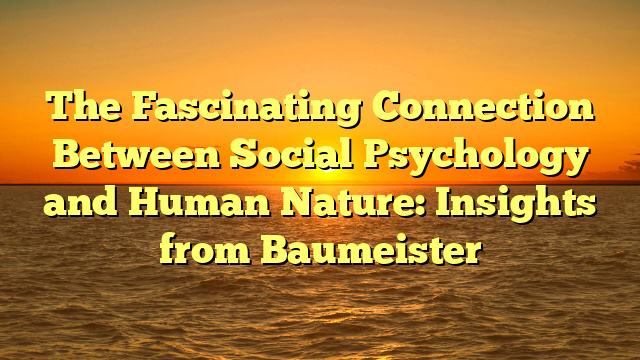The Fascinating Connection Between Social Psychology and Human Nature: Insights from Baumeister
The Fascinating Connection Between Social Psychology and Human Nature: Insights from Baumeister
Social psychology is a field that explores how individuals think, feel, and behave in social situations. It examines the influence of social factors on human behavior and the ways in which people interact with one another. At the same time, human nature refers to the inherent qualities and characteristics that define what it means to be human. These two concepts may seem distinct, but they are actually deeply interconnected.
One of the leading figures in the study of social psychology and human nature is Roy Baumeister, a renowned psychologist whose work has shed light on the complex relationship between the two. Baumeister’s research has provided valuable insights into the ways in which social factors shape human behavior and the underlying psychological processes that drive our actions.
Insights from Baumeister
Baumeister’s work has uncovered a number of fascinating connections between social psychology and human nature. One of his most notable findings is the concept of self-regulation, which refers to the ability to control one’s thoughts, emotions, and behaviors in order to achieve long-term goals. Baumeister has demonstrated that self-regulation is a crucial aspect of human nature, and that it is heavily influenced by social factors.
In one of his seminal studies, Baumeister and his colleagues found that self-regulation is a limited resource that can be depleted over time. This means that individuals who exert self-control in one area of their lives may be less able to do so in another. This has important implications for understanding human behavior, as it suggests that our ability to regulate our actions is not fixed, but rather influenced by the social context in which we find ourselves.
Baumeister has also explored the ways in which social factors influence our sense of belonging and connection with others. His research has shown that humans have a fundamental need to belong, and that this need plays a crucial role in shaping our behavior and attitudes. Baumeister has demonstrated that social exclusion can have profound psychological effects, leading to feelings of loneliness, depression, and even physical pain.
Furthermore, Baumeister’s work has highlighted the ways in which social psychology can help us understand the underlying motivations behind human behavior. He has shown that many of our actions are driven by a desire to maintain a positive self-image and to gain the approval of others. This insight has important implications for understanding a wide range of behaviors, from consumer choices to interpersonal relationships.
Implications for Society
The insights provided by Baumeister’s work have important implications for society as a whole. By understanding the ways in which social factors influence human behavior, we can develop more effective strategies for promoting positive social change. For example, Baumeister’s research has shed light on the ways in which social exclusion can lead to negative outcomes, suggesting that efforts to promote inclusivity and belonging can have far-reaching benefits.
Furthermore, Baumeister’s work has important implications for understanding and addressing social issues such as addiction, obesity, and violence. By recognizing the role that social factors play in shaping these behaviors, we can develop more effective interventions that take into account the complex interplay between individual psychology and social context.
Conclusion
The connection between social psychology and human nature is a fascinating and complex one, and the work of researchers like Roy Baumeister has provided valuable insights into this relationship. By understanding the ways in which social factors influence our behavior, we can gain a deeper understanding of what it means to be human and develop more effective strategies for promoting positive social change.

